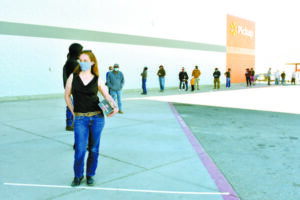Gov. tightens COVID-19 restrictions; officials warn hospitals could fill to capacity
By Phil Scherer and Ryan Lowery
 Gov. Michelle Lujan Grisham announced that New Mexico will be putting its strictest restrictions back in place for the next two weeks in an attempt to slow the spread of COVID-19.
Gov. Michelle Lujan Grisham announced that New Mexico will be putting its strictest restrictions back in place for the next two weeks in an attempt to slow the spread of COVID-19.
At a press conference Friday, Lujan Grisham announced that from Nov. 16-Nov. 30, in-person services for non-essential activities will be halted and New Mexicans will be instructed to “shelter in place.”
Essential businesses — such as grocery stores, pharmacies, shelters, child care facilities, gas stations, infrastructure operations and others — must reduce their in-person workforce as much as possible, but may remain open.
Restaurants may provide curbside pickup and delivery services. However, on-site dining is prohibited.
Retail spaces, such as grocery stores, hardware stores and “big box” stores, may not exceed 25 percent capacity or 75 people, whichever is smaller. They also must close at 10 p.m. nightly.
Houses of worship may hold religious services, but may not be used as a venue for non-religious events. Much like retail establishments, they may not exceed 25 percent capacity or 75 individuals, whichever is smaller.
Non-essential businesses, such as barbershops, salons and gyms will not be allowed to operate during this time.
Lujan Grisham said New Mexicans should stay at home except for trips involving health, safety and welfare. These include groceries, water, emergency medical care, flu shots and receiving a COVID-19 test.
“The rate of spread and the emergency within our state hospitals are clear indicators that we cannot sustain the current situation without significant interventions to modify individual behavior,” Lujan Grisham said.
New Mexico’s rolling 7-day average of new COVID-19 cases is 1,012, nearly 10 times greater than the state’s target for a safe “reopening” process. The total COVID-19 hospitalizations in the state have risen at least 214 percent over the most recent four weeks. The state has recorded 182 COVID-19 deaths over the past two weeks, a record over the course of the pandemic, and a 143 percent increase over the prior two-week period.
“Without the compliance and cooperation of New Mexicans statewide, we do not need to imagine the bleak public health calamity we will face — the images from El Paso the last few weeks, from New York City earlier this year, and from Europe at the outset of the pandemic will be our fate in New Mexico,” Lujan Grisham said. “But we can prevent this.”
Health and Human Services Secretary Dr. David Scrase said that, for months, New Mexico’s hospitals have been working together in “hubs.” He said Alta Vista Regional Hospital in Las Vegas is part of a hub that is led by Christus St. Vincent Regional Medical Center in Santa Fe, and that Alta Vista administrators meet regularly with other hub hospitals to plan and to discuss sharing resources.
However, Dr. Scrase warned that rural hospitals like Alta Vista could easily become overwhelmed because of a limited number of beds and a smaller staff. Dr. Scrase said that if regular or ICU beds at Alta Vista filled to capacity, plans are in place to transfer patients to other hospitals, possibly even out of state. But he warned of a possible shortage of beds at other hospitals as well.
“Numbers of hospital beds in (Arizona, Texas and Colorado) are coming down rather quickly as well, so those options for transfer out are declining,” Dr. Scrase said.
Lujan Grisham said that state agencies that provide support for hospitals are also stretched to capacity.
“We are in a crisis. No matter how you evaluate it, it’s a crisis,” Lujan Grisham said. “The more infections we have, and the more people that need hospital care, the harder this becomes.”
There have been 285 confirmed cases of COVID-19 reported in San Miguel County since the beginning of the pandemic, though most of those cases have been reported over the past several weeks. Of those, 97 have been deemed to have recovered so far, according to the New Mexico Department of Health. Mora County has recorded 20 cases, with five of those determined to have fully recovered.
The new restrictions in place are the same as those in place in March, at the beginning of the pandemic. Though they are scheduled to expire on Nov. 30, they could be extended by the governor before then depending on the state’s outlook.



